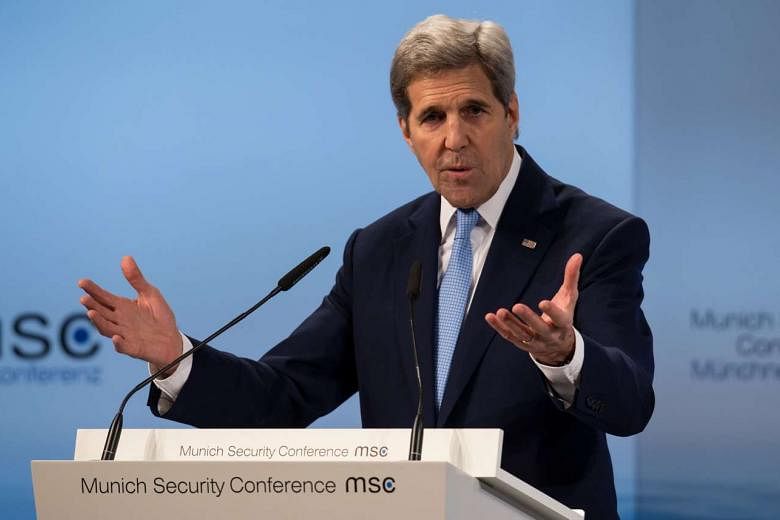MUNICH (BLOOMBERG) - The United States Secretary of State John Kerry said Syria's crisis should be settled on a political track, urging parties to take advantage of current opportunity to end the conflicts.
He said in a speech at the Munich Security Conference on Saturday (Feb 13) that political settlement is the only way to end conflicts in Syria, Xinua news agency reported.
Agreements reached by top diplomats earlier on Friday provided an opportunity that parties could not miss.
"If the international community and Syrians themselves miss the opportunity now before we to achieve that political resolution to the conflicts, the violence... will continue," he said`.
The Secretary of State said one of the issues which needed to be clarified was on the actions taken against terrorists and groups opposed to Syrian President Bashar al-Assad.
The US has claimed that Russian air strikes have been targeted against opposition groups in Syria rather than terrorists. The claim was rejected by the Russians.
Mr Kerry warned Russia to stop bombing Mr Assad opponents that are not jihadists.
"To date, the vast majority - in our opinion - of Russia's attacks have been against legitimate opposition groups," he said in his speech. "We think it is critical that the Russians' targeting changes."
Russia and the US clashed over how to carry out a day-old ceasefire plan for Syria, underscoring the tenuous level of trust between the two powers as Mr Kerry said peace efforts are at a pivotal stage. Russian Foreign Minister Sergei Lavrov suggested at the Munich Security Conference that the US is reneging on the agreement and put the chances of success at less than 50 per cent.
Mr Kerry, addressing the meeting separately, demanded an end to Russian bombing of Syrian opposition groups. "This is a hinge point," he told delegates. "We hope this week can be a week of change. It is critical for all of us to take advantage of this moment to make this cessation of hostilities work."
All major outside powers in Syria's five-year-old conflict, including the US, Russia, Turkey, Saudi Arabia and Iran, on Friday backed a truce that is set to start on Feb 19, with airdrops of humanitarian aid to begin as soon as this weekend.
Mr Kerry said a lot of work must be done to ensure an effective "cessation of hostilities" within the week to facilitate humanitarian aid.
Peace efforts intensified as Russian President Vladimir Putin's almost six-month bombing campaign backing Mr Assad delivers results, with government forces threatening to drive rebels out of Aleppo, one of their strongholds. Mr Lavrov said the agreement reached in Munich before the conference will fail unless there is constant military coordination between Russia and the US in Syria.
"If we have a practical goal of a ceasefire, then without cooperation between our militaries, this won't lead to anything," he said on a panel with his colleagues from Germany and the United Kingdom.
The US has refused to coordinate its coalition's airstrikes against Islamic State in Syria with the Russian bombing campaign because of accusations Russia is not focused on the jihadists but the Assad opposition. The US has only agreed to an accord to avoid incidents in the skies above Syria.
The US and Russia plan to chair a meeting with military officials in Geneva next week to seek agreement on which areas of Syria can be bombed.
The cessation of hostilities is due to apply to all sides in the conflict apart from Islamic State, the al Qaeda-linked Nusra Front and any other groups designated as terrorist by the UN Security Council.
Russia's military intervention since last September has upended US-backed efforts to force Mr Assad from power, raised speculation that US allies Saudi Arabia and Turkey may escalate their involvement in the conflict and added to the flow of refugees that is straining unity in the European Union.
In other signs of the tension between Russia and the US and its allies, Russian Prime Minister Dmitry Medvedev spoke of a new cold war, while the North Atlantic Treaty Organisation's secretary-general Jens Stoltenberg said Russia is using its nuclear arsenal to intimidate Europe.
"The political line of Nato toward Russia remains unfriendly and closed," Mr Medvedev told the Munich conference. "It can be said more sharply: We have slid into a time of a new cold war."
Mr Kerry sought to maintain pressure on Mr Putin over Russia's encroachment on Ukraine, which led to sanctions on Russia, and a peace plan brokered by Germany and France last year in Minsk, Belarus, that has stalled.
With the armed standoff between pro-Russian separatists and government troops in eastern Ukraine unresolved, Mr Lavrov met his counterparts from Germany, France and Ukraine on the conference's sidelines on Saturday.
"Russia has a simple choice: fully implement Minsk or continue to experience economically damaging sanctions," Mr Kerry said in Munich.

